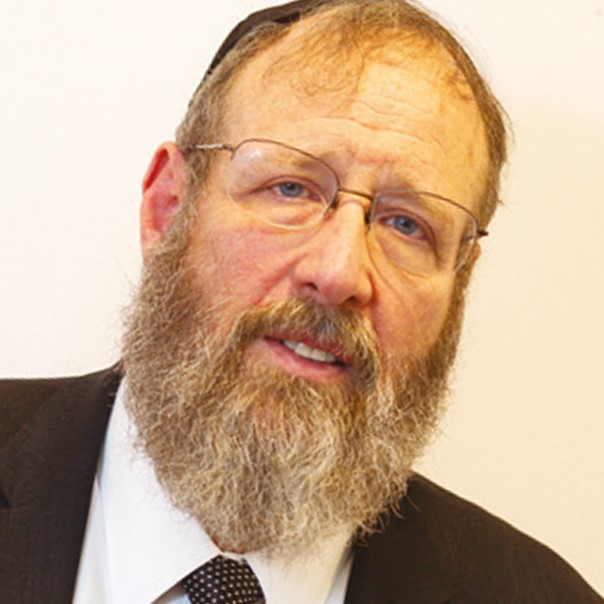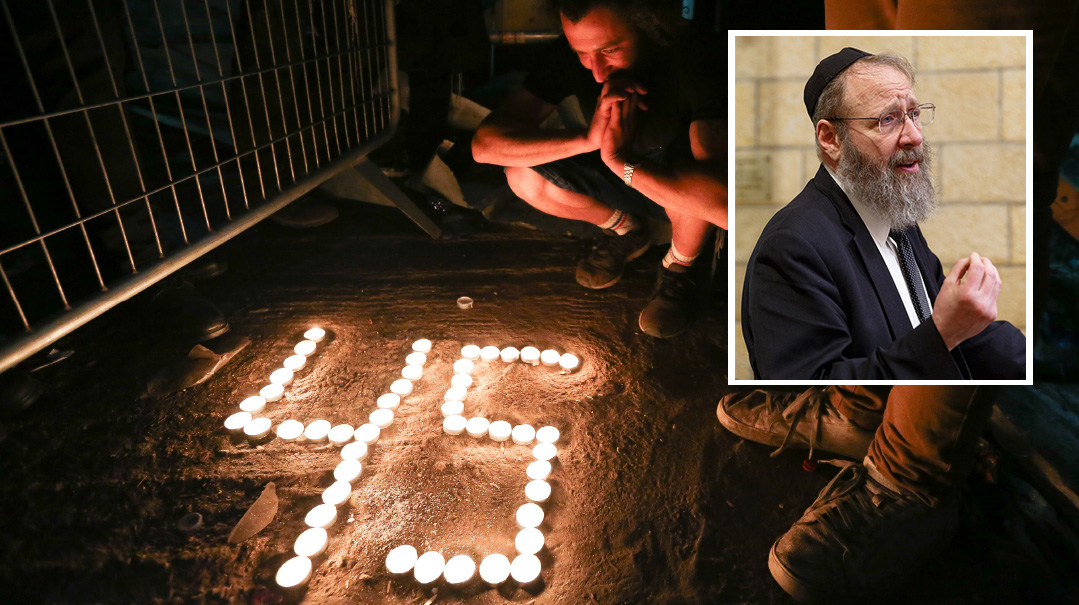Speechless

When a day of glory turns into a day of unspeakable loss, there is only one reaction for the religious Jew

In the face of unthinkable tragedy, the Torah relates, “Vayidom Aharon — and Aharon became speechless.”
Aharon did not become merely silent, for silence implies that a person has words but chooses not to express them. Vayidom implies becoming mute, meaning that the person has lost the power of speech. The Hebrew word vayidom shares a root with “domeim,” which is an inanimate object such as a rock. Vayidom signifies the diminishment of man from the highest form of existence — a medaber, a speaking creation — to the lowest form of existence, a domeim.
What is man as a “medaber”?
Man’s ability to speak is not merely a vocal skill, akin to an animal’s grunt. The power inherent in man’s speech emerged when HaKadosh Baruch Hu displayed all the animals to Adam and tasked him with naming them. This means that Adam understood their nature, and then — with his discernment and insight — he grouped the animals into separate species and determined what function each would serve. The naming of the animals is the quintessential application of man’s power of speech; it expresses the sum total of his intellectual ability, and the resultant mastery of the world that Hashem created.
Hashem even asked Adam to identify the name by which He —Hashem — would be known to His creation. Adam replied, “Adon,” for “You are Master of the Universe.” This answer is the ultimate in man’s recognition of Hashem’s dominion of the world; but it is man, with his intellectual abilities, who recognizes this. G-d is coronated as Master of the World, but mankind is the one who performs this coronation. Man’s power of speech is literally his crowning attribute.
And then there is Aharon’s “vayidom.”
An event happened that overwhelmed Aharon’s intellect and emotion. His sons perished as they performed an unauthorized avodah in the newly inaugurated Mishkan. A day of glory turned into a day of unspeakable loss. Chazal point out shortcomings of Nadav and Avihu, but Aharon HaKohein, in his greatness, recognized that while sin may have caused their death, it did not explain the event.
The explanation is “bikrovai Ekadeish” — “I will be sanctified through My close ones.” These are the words Moshe spoke to Aharon after the death of his sons (Vayikra 10:3). They convey the inescapable truth that the level of holiness in the Beis Hamikdash is so great, and that the accountability is so exact, that it towers infinitely beyond human understanding. Man stands powerless before such a revelation — powerless physically, powerless emotionally, and most significant, powerless intellectually. He recognizes that before Hashem, even his greatest abilities are vanity.
We are the generation of information and knowledge. Our achievements in the physical world are truly magnificent, and we wish to mirror that mastery in the world of ruchniyus. We have platoons of knowers and explainers who, the moment a news report flashes on the screen, claim to know the reason behind it: who is at fault, and what the “tikkun” should be. We have troves of gematriyos, passages dug out of seforim spanning the millennia, and of course segulos for every woe and ill.
At first glance, these reactions seem to rise from a deep religious instinct. But it is to the contrary; they reflect our effort to “lord” over Hashem. They express an underlying belief that we can understand Him perfectly and we can get Him to do what we wish. The one thing we are not willing to do is submit — to submit our understanding and say, in true humility, “It is beyond me.”
Rav Soloveichik ztz”l, in his introduction to Lonely Man of Faith, contrasts the “scientist-human” versus “religious-human.” The difference does not lie in proofs or arguments, but rather in their core approach to the unknown.
The “scientist-human,” when confronted with a towering mountain, seeks to analyze, master, and conquer it. True, this is a positive facet of the human being, to whom Hashem entrusted the stewardship (i.e., “fill the earth and conquer it,” Bereishis 1:28) of the world. However, this is the lower stratum of the human being. It is the person who cannot acknowledge or submit to something beyond himself.
In contrast, the “religious-human” strives to reach beyond the limits of his own understanding. He expresses the higher stratum of mankind, the level reflected in the words “and You recognized him as worthy to stand before You.” In standing before Hashem, a person recognizes that his own knowledge and understanding are so utterly inadequate that words have ceased to exist.
“Silence be all flesh, for the Divine presence has stirred!” (Zechariah 2:17)
On Lag B’omer of 2021 we have stood before such an event. During an evening full of kedushah and achdus, while celebrating the part of Torah that is beyond words, we were shown a flash of the Awesome bikrovai Ekadeish. Yes, the Rambam in Hilchos Taaniyos stresses the need for recognition that unusually bad events that befall a tzibbur must be recognized as an act of Hashem calling for us to improve. And yes, if there are practical and natural things that need to be fixed for future gatherings, of course we must do so.
But let us not reduce the event to a “because” moment. In that terrible moment we have stood before Hashem; our understanding is naught, our words are gone — and all is Hashem. For Hashem is not in the storm, nor in the raging fire, but in the thundering silence (see I Melachim 19:11).
Although we are speaking of the value of silence in the realm of bein adam l’Makom, it is also important to emphasize the need for silence in bein adam l’chaveiro.
Too many terrible things happened during this event because of words. People were reported as dead when in fact they were alive, causing needless pain. Tragically, people found out that loved ones had passed away via WhatsApp posts, inflicting trauma that may never heal. In today’s day and age, when a forwarded message can be assumed to reach everyone instantly, there is no shogeg — no “unintentional sinner” for this terrible act. Any information forwarded — through any electronic media — should be assumed to reach every person throughout the globe, instantly. Never, ever forward anything that could hurt anyone!
And there is one more act that can be done in silence, and best done in silence, and that is “nosei b’ol im chaveiro.” The Tiferes Yisrael explains that “nosei b’ol” is not merely the actual help that one gives a friend in distress, but it includes the feeling and sensing of the pain and suffering of the other.
Pause a minute at each name of the victims, and think what their death means for their families. The sudden shock. The two-week-old who will never know her father. The kallah whose anticipation of the happiest moment in her life has blown up in her face. The family that is now staring at the empty beds of two children. On and on and on.
Just one minute of mulling over each name will overwhelm us with the tzaar of Klal Yisrael. It will change us profoundly. And in some inexplicable way, a suffering genuinely shared by many, lightens the burden, even if it’s just a wee bit.
In the merit of our awed silence before Hashem and our compassionate silence before those who have suffered such sudden, wrenching loss, may He soon bring the Geulah Sheleimah and with it, an end to all our suffering and confusion. May we merit to stand before Hashem not only in awe, but also in pure simchah, speechless with joy.
Originally featured in Mishpacha, Issue 859.
Oops! We could not locate your form.







